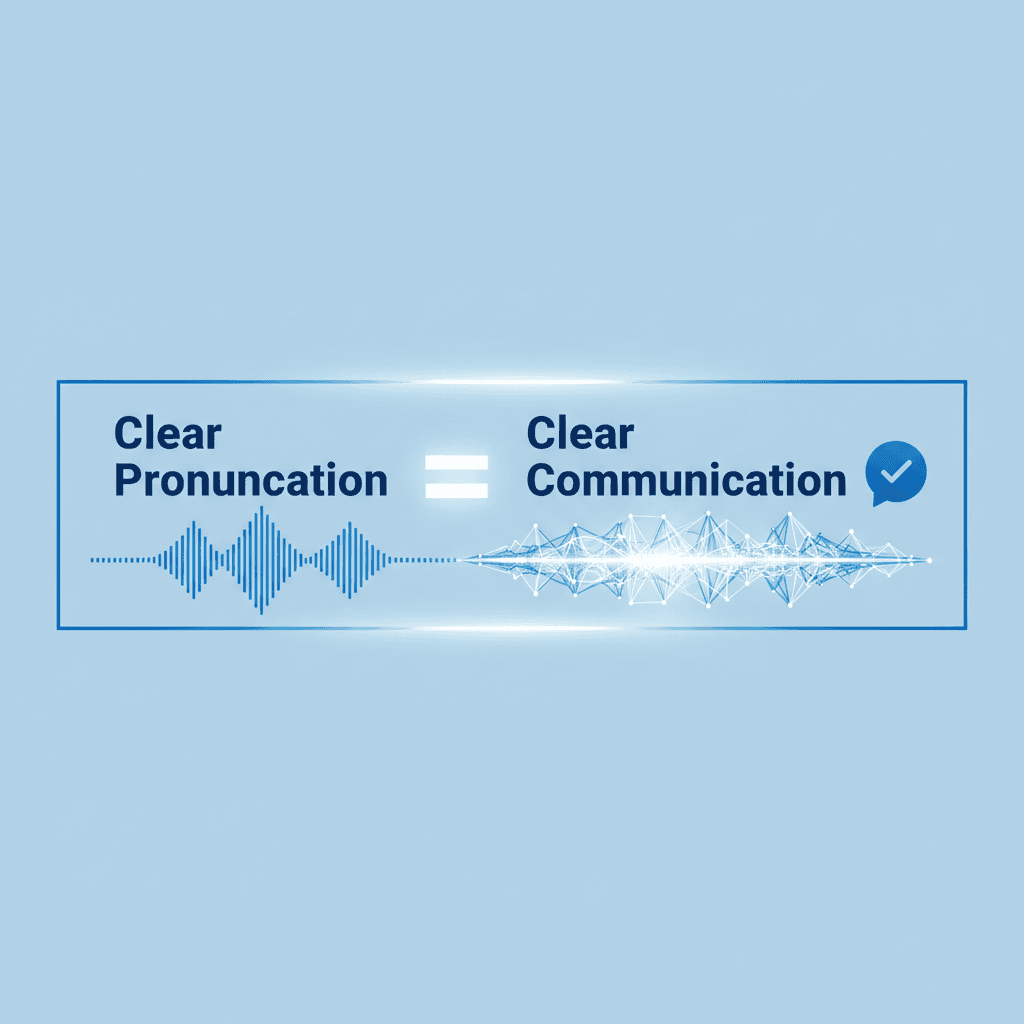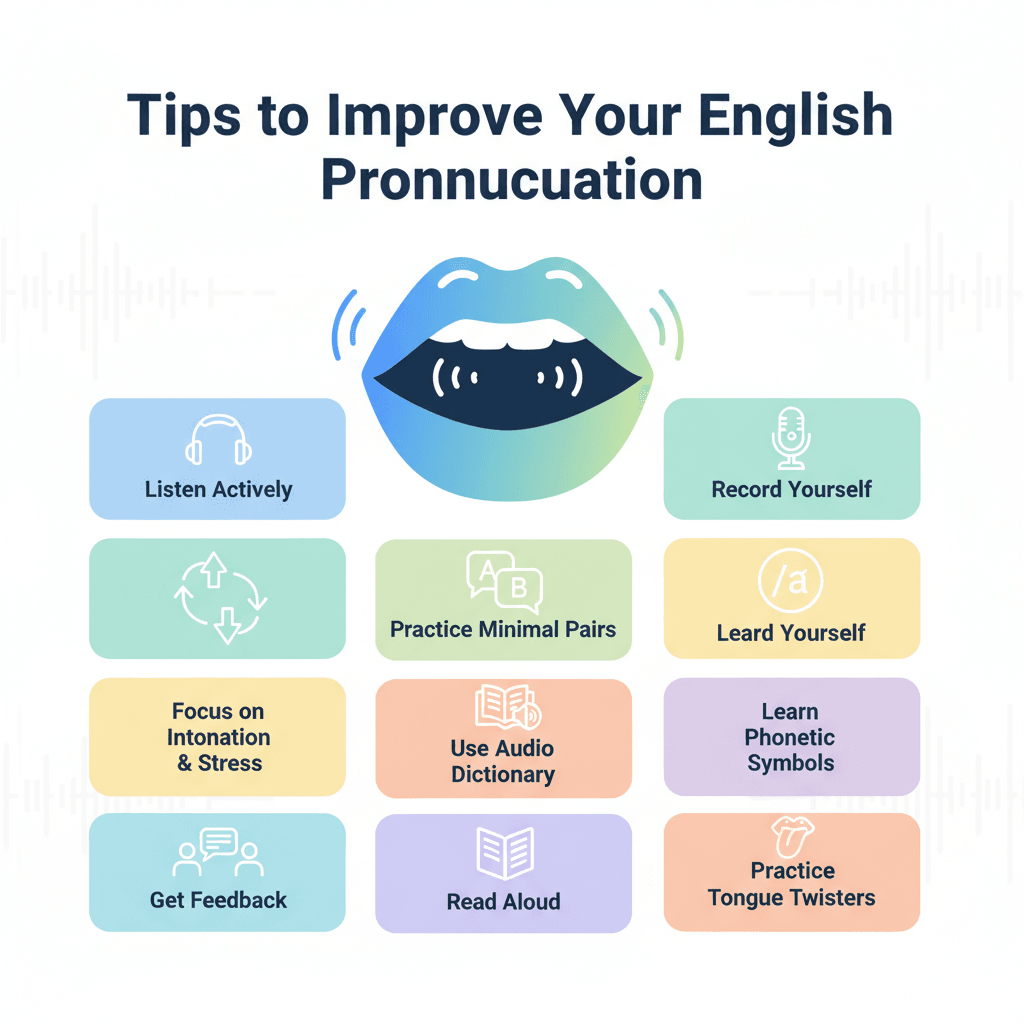The Importance of Pronunciation: How Clapingo Online Classes Improve Your Speaking Skills
Learn why pronunciation is key to clear English speaking. Discover expert English pronunciation tips and see how Clapingo’s online classes help you improve fluency and confidence.

Correct Pronunciation = Effective Communication
Imagine this: You’re at work, giving a presentation. You’ve prepared well, but a few mispronounced words leave your colleagues confused. Suddenly, your confidence drops, even though your ideas are strong. Sounds familiar?
This is where pronunciation plays a vital role. Speaking English is not just about grammar and vocabulary. If your pronunciation isn’t clear, your message won’t reach your audience the way you intend.
In this blog, we’ll explore the importance of pronunciation, share practical English pronunciation tips, and show you how Clapingo’s online classes can help you achieve clear English speaking skills that boost your personal and professional success.
Why Pronunciation Matters in English Communication
1. Clarity and Understanding
Pronunciation is the bridge between words and meaning.
Mispronounced words can confuse listeners or change the meaning entirely.
Example: “Desert” (dry land) vs. “Dessert” (sweet dish).
2. First Impressions Count
In professional settings, clear pronunciation makes you appear more confident, credible, and competent.
Your accent is fine but unclear sounds can make it harder for people to follow you.
3. Confidence in Speaking
When you know you are pronouncing words correctly, you feel more relaxed while speaking.
Confidence naturally leads to better conversations, interviews, and presentations.
4. Building Connections Globally
English is a global language. Clear pronunciation ensures smooth communication with people from different regions and backgrounds.

Common Pronunciation Mistakes
Common Pronunciation Challenges for English Learners in India
Silent Letters Confusion
Words like debt, receipt, subtle often confuse learners.
Vowel Sounds
Indian languages usually have fewer vowel sounds compared to English, leading to mispronunciation.
Example: “Ship” vs. “Sheep.”
Stress and Intonation
English words often change meaning based on stress.
Example: ‘Record (noun) vs. re‘cord (verb).
Consonant Clusters
Words like strengths, clothes, or crisps are difficult due to multiple consonants together.
Mother Tongue Influence (MTI)
Regional accents often interfere with English sound production.
English Pronunciation Tips for Clear English Speaking
Here are simple, actionable tips you can practice daily:
1. Listen Actively
Watch English movies, news, or podcasts.
Focus on how words are pronounced, not just the meaning.
2. Break Words into Syllables
Practice pronouncing words slowly, one syllable at a time.
Example: “Op-por-tu-ni-ty.”
3. Record and Compare
Record your speech on your phone.
Compare with native or fluent speakers.
4. Use Online Tools and Apps
Use dictionaries with audio features (like Cambridge or Oxford online).
5. Learn Stress Patterns
Remember: English stresses certain syllables.
Practice with words like DEvelopment, comMUNication, presenTAtion.
6. Practice Tongue Twisters
Example: “She sells seashells by the seashore.”
These help with speed, clarity, and muscle control.
How Clapingo Helps Improve Pronunciation
Clapingo is not just an English-speaking platform—it is designed for personalized fluency building, especially for working professionals, students, and learners in India.
1. One-on-One Live Sessions
You practice directly with an English expert.
Immediate feedback on pronunciation, intonation, and clarity.
2. Accent Neutralization
Tutors guide you to reduce mother tongue influence (MTI).
You learn to speak in a neutral, clear accent understood globally.
3. Practical Conversational Practice
Sessions mimic real-life situations like meetings, presentations, and casual conversations.
4. Pronunciation Drills
Clapingo trainers use repetition exercises, tongue twisters, and stress pattern drills.
5. Progress Tracking
You can track your improvement weekly with customized feedback reports.
Did You Know?
English has 44 unique sounds, while most Indian languages have around 30–35.
The word “queue” is pronounced simply as “Q.”
“Colonel” is pronounced as “kernel,” not “colon-el.”

Tips & Tricks To Improve Communication
Tips & Tricks: Quick Pronunciation Hacks
Focus on Commonly Mispronounced Words
Learn words like Wednesday (Wens-day), Entrepreneur (On-truh-pruh-nur).
Mouth Position Matters
Observe how native speakers shape their lips and tongue.
Slow Down
Speaking fast increases mistakes. Clear and steady speech always sounds better.
Shadowing Technique
Repeat exactly what you hear in real-time (like copying subtitles from a Netflix show).
Daily 10-Minute Practice
Even short, consistent practice beats irregular long sessions.
Most Common Pronunciation Mistakes (and How to Fix Them)
Even fluent English speakers sometimes make pronunciation mistakes. Here are some of the most common ones Indian learners face—and quick fixes for each:
Word | Common Mistake | Correct Pronunciation | Quick Fix |
|---|---|---|---|
Pronunciation | “Pro-noun-ciation” | Pro-nun-ciation | Remember: There’s no “noun” in pronunciation! |
Wednesday | “Wed-nes-day” | Wens-day | The “d” sound is silent. |
Receipt | “Re-ceept” | Re-seet | The “p” is silent. |
Genre | “Jen-ray” | Zhon-ruh | It’s a French-origin word with a soft “zh” sound. |
Develop | “Dee-velop” | Duh-vel-up | Stress is on the second syllable. |
Often | “Off-ten” | Off-en | The “t” is usually silent in modern English. |
Tip: Make a list of 10 tricky words you often mispronounce. Record yourself saying them correctly every day for a week.
How to Practice Pronunciation the Smart Way
You don’t need fancy equipment—just smart techniques and daily habits.
Here’s how to practice pronunciation effectively:
Mirror Practice:
Speak in front of a mirror and notice your mouth movement. Adjust the shape of your lips and tongue.Shadow Listening:
Choose a short English video clip. Play, pause, repeat exactly what the speaker says, matching tone and rhythm.Word of the Day Challenge:
Pick one word daily that’s tricky for you. Use it in three different sentences.Phonetic Awareness:
Learn how sounds (phonemes) work. For instance, th in “think” vs. “this” makes two different sounds.Join a Pronunciation Community:
Engage with learners on platforms like Clapingo to get real-time corrections and motivation.
How Technology Can Help You Master Pronunciation
Technology has made pronunciation practice easier than ever. Here are tools you can use daily:
🎧 YouTube: You can hear real people using words in YouTube videos, excellent for understanding variations.
🗣️ Google Translate Audio: Type any word and tap the speaker icon for correct pronunciation.
💻 Clapingo App: Personalized sessions with human tutors who correct your pronunciation live.
Clapingo Bonus Tip: Combine AI-based tools with live conversation classes for maximum impact. Technology trains your ear; human feedback perfects your speech.
Regional Accent Challenges and How Clapingo Helps
In India, every region has its own beautiful accent—but sometimes, regional sounds interfere with clear English speaking.
Here’s how Clapingo helps neutralize them:
Region | Common Challenge | Clapingo Approach |
|---|---|---|
South India | Substituting “f” with “ph” or “p” (e.g., “parfect” instead of “perfect”) | Tutors train you on lip and teeth placement for ‘f’ sounds. |
North India | Hard “r” sounds and dropping “v” in words like “very.” | Pronunciation drills for tongue placement and stress correction. |
West India | Mixing vowel sounds like “ship/sheep.” | Listening exercises for vowel differentiation. |
East India | Replacing “z” with “j” (e.g., “zero” as “jero”). | Focused word-list practice and phoneme correction. |
Clapingo’spersonalized feedback helps each learner based on their accent background; making learning fast, friendly, and effective.
Pronunciation and Emotion: Sounding Natural When You Speak
Pronunciation isn’t only about correctness—it’s about sounding natural and expressive.
Here’s how to bring life to your English speech:
Use Intonation:
Rising tone for questions: “You’re coming?”
Falling tone for statements: “I’m ready.”
Stress the Right Words:
“I didn’t say he stole the money.”
(Changing the stressed word changes the meaning!)
Add Pauses:
Don’t rush. Pauses make your speech more confident and clear.
Match Emotion with Voice:
Excited → slightly higher pitch.
Serious → calm and slower tone.
Clapingo tutors use intonation exercises to help you sound engaging and natural, not robotic.
Mini Pronunciation Challenge
Try these 5 tongue twisters to train your mouth and ear muscles:
“Red lorry, yellow lorry.”
“She sells seashells by the seashore.”
“Which wristwatches are Swiss wristwatches?”
“Betty bought some butter but the butter was bitter.”
“Four fine fresh fish for you.”
Record yourself saying them three times daily. You’ll notice smoother, clearer speech within a week!

Commonly Mispronounced Words
The Connection Between Pronunciation and Listening Skills
To improve your pronunciation, you must first train your ears. Good pronunciation begins with good listening.
Here’s how listening helps:
You pick up subtle sound differences (like “v” vs “w”).
You understand sentence rhythm and natural pauses.
You hear how stress and tone change meaning.
Practical Listening Habits:
Listen to English podcasts or YouTube channels like BBC Learning English or TED Talks.
Pay attention to how the speaker says words, not just what they say.
Try “shadow listening” - repeat sentences as soon as you hear them.
Note difficult sounds and replay them multiple times.
Clapingo tutors often start sessions with short listening drills before speaking exercises — because clear pronunciation starts with clear listening.
How Pronunciation Affects Your Personality and Confidence
Many learners underestimate how much pronunciation shapes personality perception.
When your speech is clear:
You appear more confident and competent.
People listen to your ideas, not your errors.
You feel proud of how you express yourself.
On the other hand, unclear pronunciation can make you feel anxious or hesitant to speak.
The good news:
Confidence builds naturally with practice. Clapingo’s 1-on-1 environment helps you practice pronunciation comfortably, no judgment, no pressure.
💬 “The moment I stopped worrying about my accent and started working on my pronunciation clarity, my confidence skyrocketed.” – Clapingo Learner, Rohit
Real-World Pronunciation Practice: How to Use English Daily
Practicing pronunciation doesn’t need extra time. You can easily include it in your daily routine!
Here’s how:
🗣️ Morning Routine: Read your to-do list aloud in English.
☕ During Breaks: Talk to colleagues in English, focusing on clarity.
📺 Evening Relaxation: Watch shows with English subtitles — repeat lines out loud.
📞 Phone Practice: Speak English with friends or record a short voice note daily.
📚 Read Aloud: Take any short paragraph and speak it slowly, focusing on sound.
Over time, these small steps help you shift from “thinking in your language and translating” to thinking directly in English, a key part of natural pronunciation.
The Science of Sound: Understanding English Phonemes
Learning pronunciation scientifically makes it easier and faster.
English has around 44 phonemes (individual sounds); a mix of vowels, consonants, diphthongs, and combinations.
Type | Example Words | Common Issues for Learners |
|---|---|---|
Short Vowels | sit, cat, cup | Mixing “i” and “ee” sounds |
Long Vowels | seat, calm, boot | Not holding the sound long enough |
Consonants | fan, van, think, this | “f” and “v” confusion; “th” sound missing |
Diphthongs | coin, loud, fear | Flattening two-part sounds into one |
Clapingo Practice Tip:
Use the International Phonetic Alphabet (IPA) chart online to understand how each sound is made.
Clapingo trainers provide immediate corrections during sessions to help you target exact sound errors.
How to Maintain Your Pronunciation Progress
Improving pronunciation is one thing; maintaining it is another. Here’s how to make your progress permanent:
Daily Practice (5–10 minutes):
Continue repeating tricky words or phrases.Revisit Old Mistakes:
Every month, check your early recordings to notice how far you’ve come.Keep Learning New Words:
Exposure to new vocabulary introduces you to new sounds.Engage in Real Conversations:
Join meetings, discussions, or online language exchanges regularly.Stay Motivated:
Celebrate small wins, maybe you finally said “entrepreneur” or “comfortable” correctly today!
Clapingo Pro Tip:Clapingo provides post-session summaries and personalized practice plans, helping learners sustain pronunciation clarity even after completing a course.
The “Clarity Checklist” – Self-Check Your Pronunciation
Before any meeting, presentation, or video call, do this quick 1-minute self-check:
✅ Am I opening my mouth enough to pronounce sounds clearly?
✅ Am I speaking too fast? (If yes, slow down.)
✅ Did I stress the right syllables?
✅ Are my vowels distinct? (Not “cot” for “caught.”)
✅ Do I pause naturally instead of rushing sentences?
Use this checklist before every important conversation — it instantly improves clarity and boosts confidence.
How Clapingo Transformed Priya’s Pronunciation
Priya, a software engineer from Bangalore, was nervous about speaking in client meetings. She knew grammar well but often mispronounced words like schedule, data, and career.
After 6 weeks with Clapingo:
She learned to neutralize her regional accent.
Improved her vowel sounds.
Gained the confidence to lead calls with international clients.
Her manager noticed the change and praised her improved clarity in communication.
Why Clear English Speaking is a Career Superpower
Better Job Interviews: Clear pronunciation makes you stand out.
Stronger Presentations: Audiences focus on your ideas, not errors.
Team Collaboration: Reduces miscommunication at work.
Leadership Presence: Leaders are expected to speak with clarity and confidence.

Accent Neutralization for Workplace Communication
Clapingo vs. Self-Practice: Which Works Better?
Feature | Self-Practice | Clapingo Online Classes |
|---|---|---|
Immediate Feedback | ❌ | ✅ |
Accent Neutralization Guidance | ❌ | ✅ |
Real-Life Conversation Practice | Limited | ✅ |
Motivation & Consistency | Depends on you | ✅ Regular sessions |
Verdict: Self-practice is useful, but Clapingo accelerates results.
Conclusion
Pronunciation is not about sounding “foreign” or “perfect.” It is about being understood clearly and confidently. Whether you’re a student, a job seeker, or a working professional, clear English speaking skills will help you stand out, connect better, and grow faster.
With Clapingo’s expert-led online classes, you can turn your pronunciation struggles into strengths. Start small, practice daily, and let Clapingo guide you to become a confident English speaker.
Ready to improve your pronunciation? Book a trial class with Clapingo today and take the first step towards clear English speaking!
Read Now: Tongue Twisters to Improve English Pronunciation & Speech Clarity with 7-Day Challenge
Comments
Your comment has been submitted